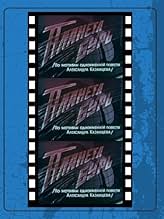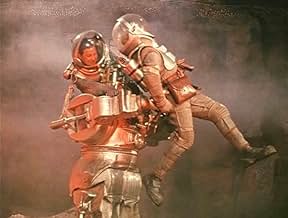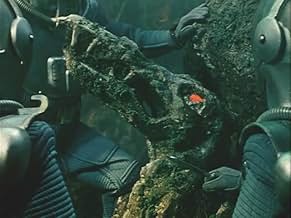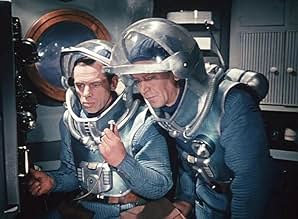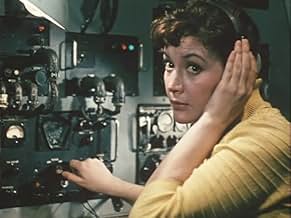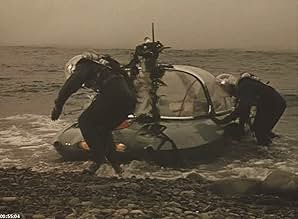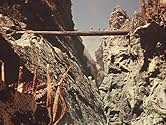Planeta bur
- 1962
- 1 घं 18 मि
IMDb रेटिंग
6.3/10
1.6 हज़ार
आपकी रेटिंग
अपनी भाषा में प्लॉट जोड़ेंCosmonauts land on the planet Venus. However, they find themselves in danger from the voracious monsters they find on it.Cosmonauts land on the planet Venus. However, they find themselves in danger from the voracious monsters they find on it.Cosmonauts land on the planet Venus. However, they find themselves in danger from the voracious monsters they find on it.
- निर्देशक
- लेखक
- स्टार
फ़ीचर्ड समीक्षाएं
The russian language version is rare, but well worth seeing. If you're really curious, you can see the American version which was retitled "Voyage to the prehistoric planet" and released in 1966. Back in the early 1960s, when this film was made, the Soviets had focused thier space program on Venus. In fact, they were the first to send probes into the atmosphere, land successfully, and return pictures from the surface. It's no wonder they were inspired to produce an extravagant adventure, based on the promise of thier exploration. The story is basic and straight forward, about an expedition to the planet Venus, but the science is flawed. They encounter oceans, flooding rains, and animal life. When this film was produced, we were just beginning to discover the truth about Venus. A surface temperature at the melting point of lead. A poisinous atmospere, with crushing pressure hundreds of times as heavy as ours. No water, or oxygen, and sulfuric acid in the clouds. If you're lucky enough to run across this film, forget all that, suspend you disbelief, and enjoy this rare classic gem.
10timayres
I saw this in my childhood and took years to track it down again since I saw it under one of its two confusing Roger Corman english-language re-edits [Voyage to the Prehistoric Planet with Basil Rathbone added, and Voyage to the Planet of Prehistoric Women, with mermaids scenes directed by Peter Bogdonavich.] Finally able to track down the original Russian version recently, I was able to fully appreciate the ambitious scope and production values. The forest is truly primeval in its detailed beauty, Robot John both heroic and sad in his dedication, and the ending poetic and lyrical. Non-U.S. science fiction films are doubly exotic, and this one is classic fare.
Pavel Klushantsev, who directed more Russian SF films than he's credited with here, found himself propelled from obscurity into sudden demand by the Soviet authorities when the production of his 1958 SF debut, 'Road to the Stars' coincided with the launch of Sputnik. Although he languished in almost total obscurity in the West, his films were enormously popular in the USSR, and, as a recent documentary noted, many of his cinematic innovations were 'borrowed' 10 years later by Kubrick in '2001'.
Planet of Storms is not a great movie, but compared with most of the SF which the USA was churning up to this time, it's positively stellar. It's weakest points are its sketchy characterisations, and rather poor pacing, but hard SF luminaries like Gernsback and John Campbell would probably have admired its attention to detail, and relative lack of sensationalism. The film actually begins with the disclaimer "Venus may well be entirely different to this" (or somesuch), and what follows is a serious attempt to depict a Venusian expedition - marred perhaps by the odd dinosaur, but surprisingly free of Soviet chest-thumping.
Planet of Storms won't blow your mind, but you'll find yourself being charmed by the ingenious photography, sets, creatures, etc. There's also a straight out hilarious scene where the Robot gets rained on, and goes off his head. While his two human companions are lying on the ground, dangerously ill from fever, he's babbling on about building a concrete highway to reach the other half of the expedition, who are are about 20 miles away. Contacting him via radio, they are somewhat alarmed to hear him tell them "According to quotes from the Smith corporation, the cost of building a highway to the Sirius is 37 million dollars". I don't know if this was a dig at capitalism, but it cracked me up anyway.
Now - some bloke wanted a translation of the lyrics to the song. These are courtesy of SBS TV Australia (translated by Elena Mikrailik and Brendan Doyle)
(first version)
Planet of Storms, we thank you for your lessons / We enjoyed our stay, but now we must be gone / Our ship awaits; our way is clear and straight / Our hearts are calling, "home, home home" / Yes, home, dear Comrades //
It's time to calculate the points of bearing / It's time to place our courage at the helm / She waits for us, the planet of our birth / Our dear home; our one and only Earth / Yes, Earth / Earth, dear Comrades //
(end of movie version)
Planet of Storms, we'll see you soon, don't worry / And in your harbour, our ships will gladly berth / For not in vain are we the sons of Earth / For not in vain are we the sons of Earth / Earth, dear Comrades
Planet of Storms is not a great movie, but compared with most of the SF which the USA was churning up to this time, it's positively stellar. It's weakest points are its sketchy characterisations, and rather poor pacing, but hard SF luminaries like Gernsback and John Campbell would probably have admired its attention to detail, and relative lack of sensationalism. The film actually begins with the disclaimer "Venus may well be entirely different to this" (or somesuch), and what follows is a serious attempt to depict a Venusian expedition - marred perhaps by the odd dinosaur, but surprisingly free of Soviet chest-thumping.
Planet of Storms won't blow your mind, but you'll find yourself being charmed by the ingenious photography, sets, creatures, etc. There's also a straight out hilarious scene where the Robot gets rained on, and goes off his head. While his two human companions are lying on the ground, dangerously ill from fever, he's babbling on about building a concrete highway to reach the other half of the expedition, who are are about 20 miles away. Contacting him via radio, they are somewhat alarmed to hear him tell them "According to quotes from the Smith corporation, the cost of building a highway to the Sirius is 37 million dollars". I don't know if this was a dig at capitalism, but it cracked me up anyway.
Now - some bloke wanted a translation of the lyrics to the song. These are courtesy of SBS TV Australia (translated by Elena Mikrailik and Brendan Doyle)
(first version)
Planet of Storms, we thank you for your lessons / We enjoyed our stay, but now we must be gone / Our ship awaits; our way is clear and straight / Our hearts are calling, "home, home home" / Yes, home, dear Comrades //
It's time to calculate the points of bearing / It's time to place our courage at the helm / She waits for us, the planet of our birth / Our dear home; our one and only Earth / Yes, Earth / Earth, dear Comrades //
(end of movie version)
Planet of Storms, we'll see you soon, don't worry / And in your harbour, our ships will gladly berth / For not in vain are we the sons of Earth / For not in vain are we the sons of Earth / Earth, dear Comrades
It doesn't compare with modern day films at all, but then one shouldn't try to, should one? Gee they all (and probably "we too") took themselves so seriously those days!!
I'm confused by one previous commentator who said the film was in black and white. Maybe her TV was, but the film as I saw it last night certainly was in colour (well, 1960s colour, anyway).
One quote from the film certainly is worth commenting. That's where they are speculating that there may have been creatures who crashed their spaceship a long time ago and then turned feral. The character comments that they would have had "no culture". Well, that's the Eastern European way, isn't it? Culture is so important; but what they can't seem to perceive, so useless. As author Stephen Coonts said of the Russians: "They can all write poetry but not a single one of them can change a light bulb" (well something like that, anyway).
But putting that to one side, yes a most interesting and well-made film of its time. The singing absolutely blew me away. Not the quality of the singing, I mean the fact that they had singing at all in what otherwise seems to me such a "serious" movie!
I'm confused by one previous commentator who said the film was in black and white. Maybe her TV was, but the film as I saw it last night certainly was in colour (well, 1960s colour, anyway).
One quote from the film certainly is worth commenting. That's where they are speculating that there may have been creatures who crashed their spaceship a long time ago and then turned feral. The character comments that they would have had "no culture". Well, that's the Eastern European way, isn't it? Culture is so important; but what they can't seem to perceive, so useless. As author Stephen Coonts said of the Russians: "They can all write poetry but not a single one of them can change a light bulb" (well something like that, anyway).
But putting that to one side, yes a most interesting and well-made film of its time. The singing absolutely blew me away. Not the quality of the singing, I mean the fact that they had singing at all in what otherwise seems to me such a "serious" movie!
It is a bit odd having a robot named John speaking monotonic Russian, but this is a pretty interesting film. I also found it interesting that a couple of English phrases were tossed in on occasion. This is not at all what I was expecting, which was something along the lines of "OUR space program is better than YOUR space program", considering the year this was made. However, there was only one passing reference to any political/ideological struggle, and that was probably thrown in to appease whatever Soviet film board that had to give its approval to this movie. I would recommend this one for any sci-fi junkies out there who like to see what other countries did with the genre.
क्या आपको पता है
- ट्रिवियाThis movie is later edited and dubbed as "Voyage to the Prehistoric Planet", released in the US in 1965. This movie (and the Russian inserts) were in turn used to create "Voyage to the Planet of Prehistoric Women" (1968)
- इसके अलावा अन्य वर्जनFor the U.S. version, titled Voyage to a Prehistoric Planet (1965), all footage of Kyunna Ignatova has been removed and replaced with footage of American actress Faith Domergue playing the same part.
- कनेक्शनEdited into Voyage to the Prehistoric Planet (1965)
टॉप पसंद
रेटिंग देने के लिए साइन-इन करें और वैयक्तिकृत सुझावों के लिए वॉचलिस्ट करें
- How long is Planeta bur?Alexa द्वारा संचालित
विवरण
- चलने की अवधि1 घंटा 18 मिनट
- ध्वनि मिश्रण
- पक्ष अनुपात
- 1.37 : 1
इस पेज में योगदान दें
किसी बदलाव का सुझाव दें या अनुपलब्ध कॉन्टेंट जोड़ें


